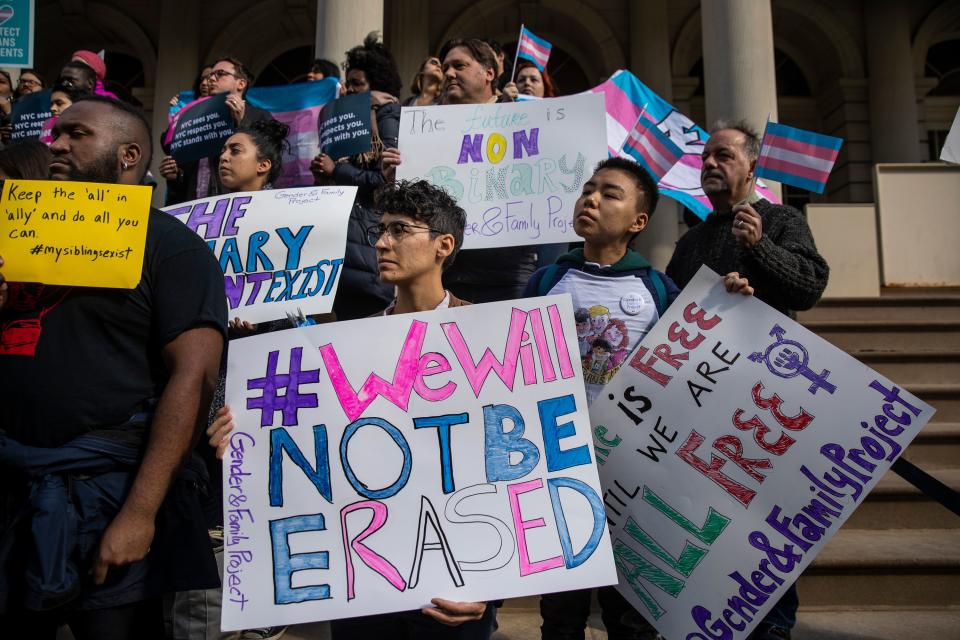Teddy Quinlivan: Why I’m Standing Up Against Trump’s Anti-Trans Agenda
On Sunday, a report about a document that was leaked containing plans outlined by the Trump administration to legally push the idea that gender should be defined “as a biological, immutable condition determined by genitalia at birth” came out. It was a devastating and despicable shot to the heart for the LGBTQ+ community, and especially to those who identify as transgender and nonbinary. But it was also a call to action. Here, model and activist Teddy Quinlivan shares her personal story and discusses what we can all do to combat hatred, secure our freedoms, and, in the words of former President Obama, “embrace all, not just some.”
When I came out to my mom at 16 years old that I knew that I was a girl inside, I didn’t know what to expect. I never knew anyone who felt the same way I did, and I had definitely never heard the term “transgender.” At my public high school in Shrewsbury, Massachusetts, I would walk through the halls with my head down while the girls laughed and the boys yelled “faggot” and “tranny.”
One day in gym class as I dressed myself in the men’s locker room in a corner that I liked because I thought it was safer to change where no one would see me, a boy walked up and announced in detail about how he was going to “beat the fag out of me.” He remained in gym class and I was sent to the principal’s office to explain what I had done to provoke him. I told the principal that all I did was change my clothes, to which the principal told me that I was a boy and there was nothing I could do to change that and if I didn’t want to get bullied or beaten I would have to start “acting like a man.”
That wasn’t the first time this happened to me; in fact this sort of thing happened to me on a daily basis. I was transgender and everyone else was cisgender, and I felt in my soul I would probably never be understood. I’m 24 now. I’ve met dozens of other trans and non-gender-conforming people, and I know I’m not alone. I no longer feel threatened by the bullies in school and the establishment that protected them and reinforced their prejudice. Now I feel threatened by the United States government.
Take a moment to reflect on the role gender plays in your existence down to the fine details. What in your daily life is gendered? We associate gender with what clothes we put on in the morning, the length of our hair, the colors we like, the cars we drive, the jobs we do, the tone in which we speak, the way we walk, the way we communicate, the way we smell, the music we listen to, the sports we play, what cocktails we drink, the bathrooms we enter, et cetera . . . . Gender smacks us in the face from the time we wake up until the time we go to bed. Luckily for most people this isn’t something that needs much contemplation, but if you are one of the approximately 1.4 million people in the United States who are trans, there is no escaping the impact and importance of gender on a personal and societal level. Gender is more than anatomy, it’s an experience.
The Trump administration is putting forth a plan that would define gender strictly as male or female based on the sex organs at birth. This new definition would eliminate the federal recognition of transgender, nonbinary, and intersex people almost completely. In other words: In the eyes of the United States government, if you were born with a penis, you are a man, and if you were born with a vagina, you are a woman. There is no spectrum, there is no in between. To someone who’s never interacted with a transgender, intersex, or nonbinary person or lacks familiarity with such people; this may not seem like such a big deal. After all, if you’ve never had to question if your sex organs match your very essence, this may not be something you’ve felt is necessary to explore.
Societally we’ve come to the conclusion that while some things are masculine or feminine, it doesn’t necessarily mean we must conform to those gender standards. Not all girls enjoy playing with dolls and not all boys love football. So why is it so challenging for so many people to believe that in a world with about 7.53 billion people there is a possibility that a percentage of that population doesn’t feel that their given sex organs match their psychology? And why does it matter so much how people in a free country choose to identify?

775247971
The argument is that by allowing people to identify freely, it puts the masses at risk for sexual misconduct and violence within private gendered spaces such as bathrooms and locker rooms. There is a distrust of transgender people particularly among the conservative religious right. They believe that people will abuse trans freedoms given by the Obama administration. This fear stems from decades of a narrative that trans people are crazy and/or dangerous, perpetuated by the portrayal of transgender individuals in conservative media—think channels like Fox News and shows like Jerry Springer—or even in movies like The Silence of the Lambs. There is no legitimate merit in this fear backed by statistics or science. In other words, trans people are misunderstood, and this unsubstantiated fear has legitimate consequences for trans individuals.
Transgender people are some of the most marginalized in society. Trans individuals experience verbal and physical violence simply for being who they are. Lack of trans acceptance and resources have lead to high suicide rates, with 30 to 51 percent of transgender adolescents admitting they’ve attempted to take their own lives. Nonetheless, this ingrained fear has been utilized by Trump, and he’s used this issue to engage his base.
With the midterm elections in less than two weeks, Trump has seemingly timed the leak of his proposed rollback perfectly to appease his constituents, who believe that transgender rights and freedoms are a threat to the status quo. A trend among his base is a core belief that granting too many freedoms will impede upon the moral sanctity of the nation. This tactic has historically been used not just around trans issues but also issues such as gay marriage, women’s reproductive rights, and racial justice. People with this archaic outlook are either misinformed, uneducated, or bigoted. The world tends to evolve on most social issues at a snail’s pace, but this shouldn’t discourage others from fighting for what’s right and just in the present moment.
The issue of trans rights is a relatively new one, gaining more traction in the past several years with increased visibility. Unfortunately, Trump’s language, character, and decorum have emboldened people with prejudice. For Trump, transgender people are an easy target given that we only make up about 0.5 to 0.6 percent of the United States population. It may appear like a difficult battle and it will be for trans people, but this is why solidarity is important now more than ever.
This is the moment to educate those who don’t understand and to stress the importance of standing up for one another. This is the only way we can make progress on this issue. If you are transgender living in stealth, this would be an amazing time to come out and shed light on your existence and humanity; the Trump administration plans on utilizing genetic testing to determine one’s birth sex, so hiding may not be an option for much longer anyway. If you are cisgender and are an ally to the trans community, share your voice of support. Most importantly, this is the moment to exercise your right to vote. Vote for justice. Vote for your trans, intersex, and nonbinary friends. Vote for the kid in your school who was bullied. Vote because it’s transgender freedoms now and it could be yours next. Using your democratic rights is critical to affecting change. It may be the only hope we have to protect what we believe in most, the core principle on which the United States was founded: freedom.


